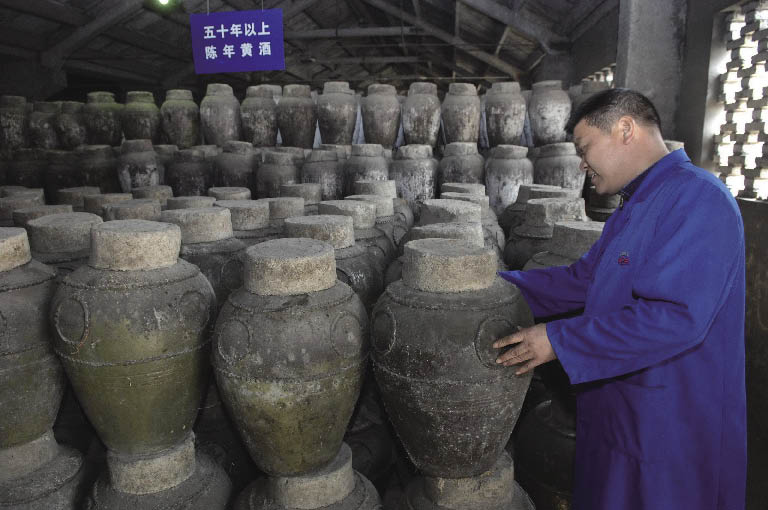|
Shaoxing, Home of Rice Wine

Rice wine is a beige or brown alcoholic drink. The color is the result of chemical reactions between sugar and amino acid, or comes from caramel.
Shaoxing people prefer rice wine, which is lower in alcohol and mellower. "Good rice wine can be shelved for 10, 20 or 50 years, and it grows better with the passage of time. But inferior brews have a short life span," said a local brew master whose favourite is 10-year old rice wine. "After a decade all flavours – sourness, sweetness and fragrance – have fully mellowed and been perfectly mixed and finely soaked by the liquid. Take a sip, whisk it around the mouth before letting it down the throat. That's real enjoyment."
Jianhu Lake, 10 minutes drive from Shaoxing, supplies water for all rice wine producers in the city. Regardless of its shrinking size over the past decades, the quality of its water is largely intact. To illustrate the superiority of Jianhu water, Pan Xinxiang, director of Pagoda Brand Rice Wine Co., Ltd., flipped a coin into a glass of water from Jianhu Lake. The glass was full to the brim. The water surface rose, but not a single drop spilled over the brim. Pagoda is one of the few rice wine breweries that still adhere to traditional manual production. That's why its products have long been ordered by choosy Japanese importers.
According to Mr. Pan, hand-made rice wine excels machine-made brew, because its fermentation is done in natural conditions, overseen by experienced brew masters who closely monitor every step of the process, and make adjustments accordingly.
Gao Xiushui is such a brew master, nicknamed Brew Mind by locals. He started the career as a 16-year-old apprentice and has been in the trade for over 30 years. "Till today I never dared boast that I made the best liquor." For the water, rice and weather vary year to year. "In a cold winter, the period of fermentation has to be longer, and when temperatures are higher, the time has to be shorter," Gao explained, adding, "For the past 30 years I cannot remember any year when the temperature was the same as the previous year, so that I could repeat exactly what I had done earlier." Gao relies on his instinct, attributing every successful year to the "blessing of Heaven."
Dongpu is a town 30 minutes' drive from Shaoxing. It was a brewing center a century ago. Though distillery workshops can no longer be seen today, the tradition of home brewing has continued, and the sight of elders sipping from coarse clay bowls is not uncommon.
Old distilleries have been converted into civil residences, including that of Qing revolutionary Xu Xilin (1873-1907). Stacks of liquor jars still adorn his yard. Every family makes a dozen jars of rice wine every year. They are sealed and stored for one or two years before being served. This milky home brew is free of caramel, but exudes a smell as inviting as those brews manufactured by professional hands.
|

